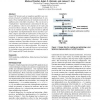Free Online Productivity Tools
i2Speak
i2Symbol
i2OCR
iTex2Img
iWeb2Print
iWeb2Shot
i2Type
iPdf2Split
iPdf2Merge
i2Bopomofo
i2Arabic
i2Style
i2Image
i2PDF
iLatex2Rtf
Sci2ools
ICCAD
2004
IEEE
2004
IEEE
Custom-optimized multiplierless implementations of DSP algorithms
Linear DSP kernels such as transforms and filters are comprised exclusively of additions and multiplications by constants. These multiplications may be realized as networks of additions and wired shifts in hardware. The cost of such a “multiplierless” implementation is determined by the number of additions, which in turn depends on the value and precision of these constants. For a given transform or filter, the set of constants and their required precision is affected by algorithmic and implementation choices and hence provides a degree of freedom for optimization. In this paper we present an automated method to generate, for a given linear transform, a minimum addition multiplierless implementation that satisfies a given quality constraint. The method combines automatic algorithm selection to improve numerical robustness and automatic search methods to minimize constant precisions in a chosen algorithm. We present experiments that show the trade-offs between cost and quality, ...
Automatic Algorithm Selection | Automatic Search Methods | Hardware | ICCAD 2004 | Linear DSP Kernels |
| Added | 16 Mar 2010 |
| Updated | 16 Mar 2010 |
| Type | Conference |
| Year | 2004 |
| Where | ICCAD |
| Authors | Markus Püschel, Adam C. Zelinski, James C. Hoe |
Comments (0)

